- Home
- David Liss
A Spectacle of Corruption Page 3
A Spectacle of Corruption Read online
Page 3
And then, in a flash, the enormity of what had happened pressed itself on me. I had been convicted of murder and sentenced to die. I had committed crimes in my time—and hanging crimes too—but the unfairness of this conviction made me dizzy with rage. In the benches my friend Elias Gordon shouted that this injustice would not stand. My uncle called to me, telling me that he would use all the influence he could muster to intervene on my behalf. But their words buzzed distantly in my ears. I heard them but did not hear them.
I felt the bailiffs pull me away, a firm grip on either arm. My muscles began to tighten, and for a moment I thought of attempting to break free. Why should I not? I could overpower these men. What rule had the law over me, now that it had so abused me?
But then there she was, directly in front of us, the woman with the yellow hair. Her pretty face was now red and raw. Tears poured from her eyes. “Oh, Benjamin,” she screamed, “don’t leave me! I’ll die without you!”
This outcome seemed to me unlikely, since she had lived her entire life thus far without me, and that condition had done nothing but leave her hale and healthy. Nevertheless, there could be no easy refutation of the force of her emotion. She threw herself at me, wrapped her hands around my neck, and covered my face with kisses.
I should have been delighted to receive the attentions of so fine a woman under other circumstances—circumstances, let us say, that did not involve my death having just been mandated by law—but here I could only stare in confusion. The woman, now pushed back by the bailiffs, began to wail and cry of injustice. And then she turned just so, a masterfully natural turn that any tumbler or posturer at Bartholomew Fair might envy. Now the creaminess of her breasts, exposed to no small degree by the cheerful cut of her bodice, brushed against the hands of one of my keepers.
Distracted and delighted and perhaps discomfited too, the bailiff paused in mid motion, turning red in the face. The woman appeared to pause as well. She leaned forward just enough to press her skin against his hand. The bailiff stared at his hand and the flesh it touched. His companion bailiff stared as well, envious that fate had ordained this less deserving hand to find favor with the lady’s bosoms. In that moment of confusion, she, with the dexterity of a cutpurse, slipped something into my hand. Some things, I should say, for I could tell in an instant that there were two objects, and I heard the clean note of their music as they clanked together—cold hand hard and sharp.
I did not need to look at them to know what they were. I had felt such things and, indeed, used them most villainously in my greener years when I had plied my trade outside the law: a lockpick and a file.
Events of the past few days had happened so quickly and so strangely, I felt I understood almost nothing, but I now knew two things with absolute certainty. I knew that someone desperately wanted to see me convicted and sentenced to hang, to which end the law had been cruelly abused.
And, just as surely, someone wanted me free.
CHAPTER 2
HOW HAD I FOUND myself in so dire a condition? I could not even begin to fathom this upheaval, but I knew that my difficulties were in some way linked to the services I had engaged to render to Mr. Christopher Ufford, a priest of the Church of England, serving at St. John the Baptist Church in Wapping.
In the melancholy that had settled upon me since Miriam wedded herself to a Christian gentleman, I had left my business in a state of neglect. I hardly worked at all for some months, preferring to pass my time in drink and debauchery—or else sullen contemplation—and sometimes a combination of all. So when I received notice from this cleric the same day I received three urgent notes from my creditors, I thought it best to do as I had been promising myself I would do for some months—that is to say, shake off my stupor and resume my business. I therefore dressed myself neatly in a dark suit with a clean shirt. I splashed the sleep off my face, bound up my hair, which I wore in the style of a tie periwig, and traveled by hackney coach to York Street, at which address Mr. Ufford desired me to call upon him.
I set off that morning little thinking that I would, more than thirty-five years later, commit my actions to paper, but had I been so aware, I might have taken some additional notice of the disorderly men who surrounded me as soon as I exited my hackney in Westminster. Here were four fellows, made, unknown to them, to perform the literary act of foreshadowing. They took their positions at my four corners and sneered. I thought them nothing more than the countless thieves who haunted the streets since the South Sea Company had collapsed, taking the nation’s wealth with it. But these were a different sort of criminal.
“Which be ye, Whig or Tory?” one of them, the largest—and very likely the drunkest—of them snarled at me.
I knew that the six-week-long election season was nearly upon us, and candidates would often canvass in advance by hosting riotous parties at taverns in which lowly men such as these, men who surely did not possess the vote, might drink their fill. The reason for the politicians’ generosity was quite plain: They hoped their uncouth guests might go forth and behave just as these fellows now behaved, coarse advocates of their cause.
As it was quite early in the morning, I could only presume that these men had not yet taken their sleep. I stared at them, with their unshaved faces and ragged clothes, and attempted to measure their capacity to do me harm.
“Which be ye?” I asked in return.
The leader barked a laugh. “Why should I tell you?”
I took from my pocket one of the brace of pistols I always carried about me and pointed the firearm in this man’s face. “Because you began the conversation, and I wish only to understand the level of your interest.”
“Begging your pardon, sire,” he said, grossly overestimating my position. He removed his hat and, placing it against his chest, began to bow like a Turk.
I’d have none of this groveling. “Which party are you?” I asked again.
“Whigs, if it please you, sir,” another of the men said. “What should we be but Whigs, for we’re only laboring men, you see, and not great lords, like your honor, to be Tories. We was at a tavern with drink paid for by Mr. Hertcomb, the Whig for Westminster. So we’re Whigs now, and in his service. We meant you no harm.”
I cared nothing, and knew less, for Whigs and Tories, though I understood enough to know that it was the Whigs, the party of new wealth and little church, that might be more willing to attract men such as these.
“Get gone,” I said, waving my pistol. They ran off in one direction, I walked in the other. In an instant I had forgotten about the encounter, and my mind turned to my meeting with Mr. Ufford.
I have known very few priests in my day, but from my reading I harbored the idea of dignified little men living in neat but unremarkable cottages. I was surprised to see the lavish town house in which Mr. Ufford resided. Men who seek careers in the Church tend ever to be without prospects, either because their families have not much money or because they are younger brothers and excluded from inheritance by the strict laws and customs of the land. But here was a priest who had taken for himself the whole of a fine house on a fashionable street. I could not say how many rooms he possessed, or of what nature, but I soon found that the kitchen was of the finest quality. When I knocked upon the front door, a ruddy-faced manservant told me I could not enter thus.
“You must approach from the rear,” he told me.
I rankled not a little at this treatment and thought to comment most unkindly on his orders, but his usage was, if not common, hardly unprecedented. Perhaps the excess of wine I’d consumed the night before inclined me to irritation. Nevertheless, I cast aside my annoyance and walked to the side entrance, where a stout woman with arms as thick as my calves directed me to a large table fixed in one corner. Sitting here already was a fellow of the meaner sort, not old but aging ungracefully, grizzled about the face, lacking a wig, with nothing on his balding and close-cut pate but a wide-brimmed straw hat. His clothes were of the plainer sort of undyed linens, though clearly new, an
d adorned only with his pewter porter’s badge, which he wore pinned to his right breast. I could not say why, not knowing the man, but I had immediately the distinct impression that Mr. Ufford had bought the clothes for him, and recently too—perhaps for this very meeting.
Soon another man, wearing a black coat and a white cravat—a style I recognized as priestly—entered the kitchen tentatively, as though sneaking a look at a room in a house where he was a dinner guest. On meeting my eyes, he simpered briefly. “Benjamin,” he cried with great warmth, though we had never before met. “Come in, come in. I am glad you could meet me as I requested, and at such short notice too.” He was tall, inclined to be plump if not fat, and with a sunken face that resembled a crescent moon. He wore a tie wig, new and carefully powdered.
I bristled a little, I admit, at the unexpected use of my name. I had never met the man before and had no reason to expect such familiarity. I suspected that if I were to address him as Christopher, or perhaps even Kit, he would not take it kindly.
“I am honored to be able to attend you, sir,” I said, with a shallow bow.
He gestured toward the table. “Come, sit down. Sit down. Oh, yes. Where have my manners gone? Benjamin, this fellow is John Littleton. He lives in my parish and has benefited from the kindness of the Church. More than that, however, he knows the parish and the sort of men who inhabit it. I have made much use of him in recent days, and I thought you might as well.”
I turned to offer the fellow, as the priest would have it, my hand in friendship.
He took it with eagerness, perhaps relieved to see I was of a somewhat more open nature than our host. “How do ye,” he said cheerfully. “Benjamin Weaver, I seen you fight, me spark. More than once, too. I seen you beat the tar out of that Irishman Fergus Doyle, and I seen you take out that French fellow too, but I don’t recollect his name. But the best match I ever saw, let me tell you, sir, was the time you fought Elizabeth Stokes. Now, she was a great fighter of the female sort. They don’t make the likes of her no more.”
I sat next to Mr. Littleton. “The sad truth is that the art of pugilism has fallen on hard times among the ladies. Now it is all female sport, and they are made to hold coins in their fists when they fight so as to guarantee they don’t scratch out each other’s eyes. The first to unclench her fists so far as to drop the coin loses the match.”
“A rotten thing. That Elizabeth Stokes, she could lay out a punch or two.” He turned to Mr. Ufford. “A mean lass, she was—vicious as a legless rat and quick as an oiled Italian. I thought certain she would take Mr. Weaver here.”
“She pummeled me something fierce,” I told him cheerfully. “That’s the difficulty I often felt when asked to fight with a lady. Were I to lose, I would be humiliated, but when I won, there was no glory in it, for I had done naught but beat a woman. I should have refused to do it entire, but such fights always generated a hearty take at the door. Those who arranged the battles could hardly shun something so lucrative, and neither could we fighters.”
“I only wish them girls were made to strip to the waist like the men. That would make for good sport, I think, with their bubbies flying here and yon. Begging your pardon, Mr. Ufford,” he added.
Ufford’s pink skin reddened. “Well,” he said, rubbing his hands together as though preparing to move a pile of lumber, “how about some refreshment before we cut into the meat of the matter. What say you, Mr. Weaver? Can I offer you a hearty dark ale? It’s just the sort favored by hardworking men.”
“I have not been used to work so hard as I ought of late,” I told him, “but I should like an ale just the same.” As it happened, my head ached somewhat furious from the wine of the night before and, short of a bowl of saloop, ale might be just the thing.
“I thought he’d never ask,” Littleton told me quietly, as though passing along a secret. “I nearly died of thirst more than once as we awaited you.”
Ufford rang the bell, and the serving girl with the massive arms entered the room. She was no more than sixteen, somewhat stooped of stature, and of her face I could only say that nature had not been her most generous. But she appeared a cheerful lass and smiled agreeably at all of us. She listened to Mr. Ufford’s commands and then returned in an instant with pewter mugs filled with nearly foamless ale.
“Now,” Mr. Ufford said, joining us at the table. He held out a fine-looking whalebone snuffbox. “Either of you care for a pinch?” he asked.
Littleton shook his head. “I prefer my pipe.” He removed the mentioned device and began to pack it with weed from a small leather pouch.
“I’m afraid I’ll have to ask you to refrain in my presence,” Ufford said. “I cannot endure the smell of burning tobacco. It is both noxious and like to cause fires.”
“Is it, now?” Littleton asked. “Well, I’ll put it away then.”
Perhaps to demonstrate his superiority, Ufford made an exaggerated show of his snuff-taking. He took a pinch of the dust between his forefinger and thumb and then proceeded to sniff with a great furor at each nostril. He then dabbed at his nose and sneezed three or four times. Finally he set his rag aside and beamed at us, as if to show that he had not a speck of snuff left upon his face.
I had always found the ritualized process of snuff-taking exceedingly tedious. Men would make great shows of who could sniff with the greatest strength, who could sneeze the most cleanly, who had the best-formed nostrils. Ufford had clearly made a good showing, but he found his audience not fit to appreciate his art.
He coughed nervously and then clutched a goblet of wine, its stem a shiny silver. “I suppose you are curious to learn what task you will perform for me, yes?”
“I am eager to hear your needs, certainly,” I told him, trying mightily to demonstrate confidence. Having spent some months now in shirking my responsibilities, the wheels of my thieftaking mechanism were in need of grease.
I glanced over at Mr. Littleton. He had eyes only for his rapidly draining pot of ale, and his concentration allowed me to study him freely. I thought I knew him from some previous encounter, but I could not place the association, and that made me most uneasy.
“I fear I find myself in a bit of a situation, sir,” Ufford began. “A very uncomfortable one that I cannot resolve without help, and not help to be got just anywhere, as you will see. I have preached many times in my church— Oh, I forget myself. As a Hebrew you may not be familiar with the doings of a church interior. You see, during our worship, it is common for the priest to give a long talk—well, not too long, I hope—in which he discourses on religious or moral issues he thinks relevant to his congregation.”
“I am familiar, Mr. Ufford, with the concept of the sermon.”
“Of course, of course,” he said, seeming a bit disappointed that I had diverted him from the task of definition. “I knew you would be. In any case, I have been used for the past months to preach on a subject very near to my heart, and very near to the hearts of my parish, for it is principally made up of hardworking men on the lowest echelon of the laboring ranks. Men, you understand, who live week to week on their wages and for whom the loss of even a few days’ pay, or an unanticipated sickness that requires payment to a medical man, could bring utter ruin. I have taken their cause as my own, sir, and I have spoken out for them. I have spoken out, I say, for the rights of the laboring men of this metropolis, to earn a decent wage and to make enough to support their families. I have spoken out against the cruelty of those who would keep their workers so impoverished that the allure of quick earnings in heinous crime, the sin of whoredom, and the oblivion of gin all conspire to undo them, body and soul, yes, body and soul. I have spoken out against these things.”
“I daresay you are speaking out against them now,” I observed.
Again, Mr. Ufford surprised me by being so good-natured. He laughed and patted me amiably on the shoulder. “You must forgive me if I talk a bit much, Benjamin, but on the subject of the poor and their well-being I can hardly say enough.”
“You are surely admirable in that regard, sir.”
“It is only my Christian duty—and one that I should like to see others in my church embrace. But, as I say, I have taken on the poor as my cause and spoken of the injustices they face. I thought myself doing things for the good and right, but I find there are those who don’t like my message, even among the lower orders, the very men whom I endeavor to aid.”
Here Ufford reached into the lining of his coat and produced a ragged piece of paper.
“Shall I read this to you, Benjamin?” he asked pointedly.
“I have letters,” I told him, as I concentrated with great intensity on concealing my irritation. I was not often thought to be quite so unschooled as to be illiterate.
“Of course. Your race is a very learned one, I know.”
He handed me the note, which was written in a rough and uneven hand.
Mr. Youfurd,
Dam you and dam you and double dam you twice you black gard bich. No won cares to heer any of yore drivel so dam you and be silent or you will find that there ar those who will no how to make you silent by burning yore house down around yore ears or if stone wont burn by cutting yore throat so you bleed like the pig you ar. No more of yore speeches on the poor or you will no what the poor ar and what they can do and that will be the last thing you no before you go to hell you bich and pig. You have been warned wonce and wont again except in your being kilt.
I set down the note. “I have, in my days, heard the men of my religion deliver discourses with which I was not in full agreement. This response, however, strikes me as excessive.”
Ufford shook his head sadly. “I cannot tell you the shock I felt upon receiving this, Benjamin. That I, who have now decided to dedicate my life to aiding the poor, should be by any of them reviled—regardless of how small their numbers—is a great disappointment to me.”

 The Whiskey Rebels
The Whiskey Rebels Renegades
Renegades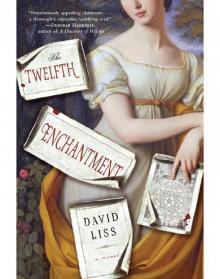 The Twelfth Enchantment: A Novel
The Twelfth Enchantment: A Novel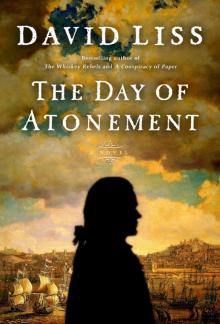 The Day of Atonement
The Day of Atonement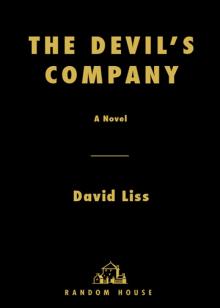 The Devil's Company
The Devil's Company Randoms
Randoms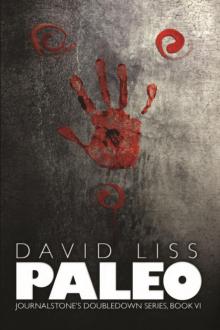 Paleo / The Doomsday Prepper
Paleo / The Doomsday Prepper Rebels
Rebels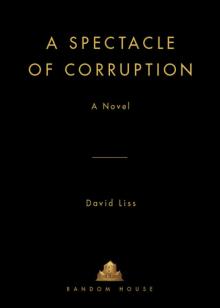 A Spectacle of Corruption
A Spectacle of Corruption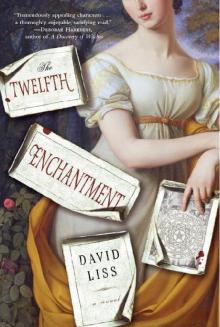 The Twelfth Enchantment
The Twelfth Enchantment The Coffee Trader
The Coffee Trader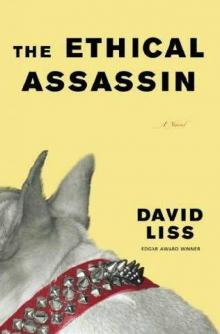 The Ethical Assassin
The Ethical Assassin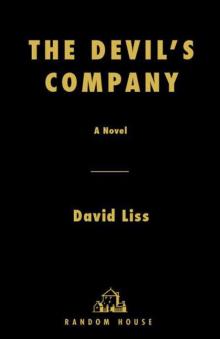 The Devil’s Company: A Novel
The Devil’s Company: A Novel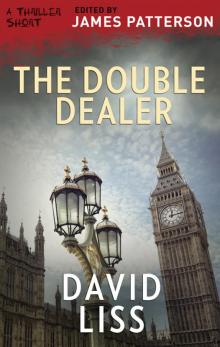 The Double Dealer
The Double Dealer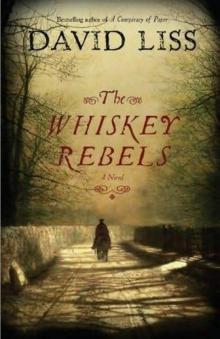 The Whiskey Rebel
The Whiskey Rebel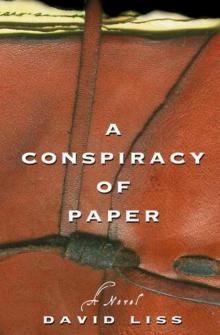 A Conspiracy of Paper bw-1
A Conspiracy of Paper bw-1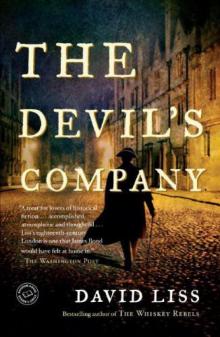 The Devil's Company bw-3
The Devil's Company bw-3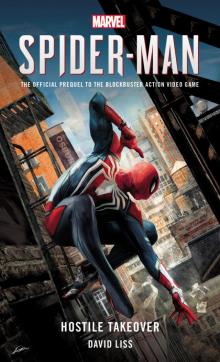 Marvel's SPIDER-MAN
Marvel's SPIDER-MAN